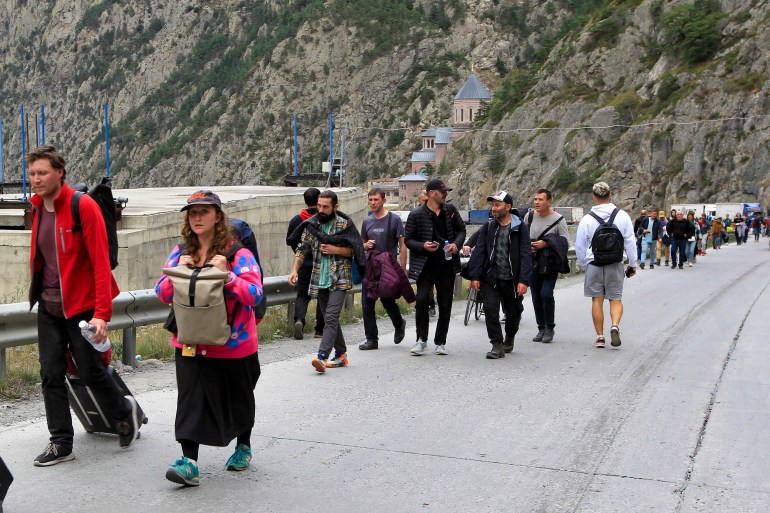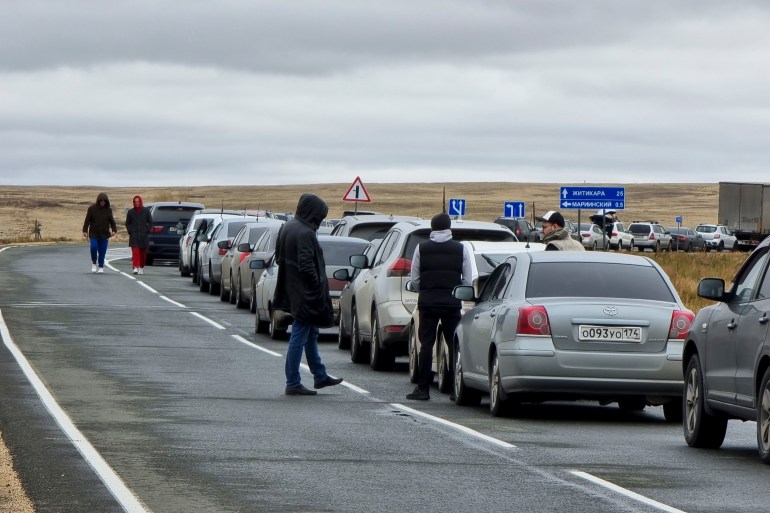Should Europe shelter Russians fleeing mobilisation?
While Europe is united against the invasion of Ukraine, it is divided on the moral and practical challenges of accommodating Russian citizens.

Belgium, Brussels – Throughout Russia’s war in Ukraine, the European Union has largely been off-limits to Russians keen to enter the bloc.
Flights and land transport to and from Russia have been banned, and EU nations have imposed stricter and costlier visa systems, making it harder to enter.
Keep reading
list of 3 itemsThe Russians fleeing Putin’s military draft
What’s next after Russia’s defeat in Ukraine’s Donetsk?
After President Vladimir Putin announced a partial mobilisation order on September 21, a move that set off a Russian rush to the borders as thousands of men tried to avoid being drafted, these entry rules became even more rigid.
And now, divisions between EU members are brewing.
Should Europe, which is united against the Russian invasion, shelter those fleeing the draft?
The Baltic nations – Estonia, Latvia, Lithuania – and Eastern European countries such as Poland, were quick to close their borders.
“Lithuania will not be granting asylum to those who are simply running from responsibility. Russians should stay and fight. Against Putin,” Lithuanian foreign minister Gabrielius Landsbergis wrote in a tweet.
He said that Russian men could protest or even become prisoners of war instead of running away to Europe.
“Asylum for 25 million draft dodgers is not an option. Russians must liberate Russia,” he added.

Other EU nations, such as Germany, have adopted a softer tone.
In an interview with the German newspaper Frankfurter Allgemeine Zeitung (FAZ), interior minister Nancy Faeser said that “anyone who courageously opposes Putin’s regime and thereby falls into great danger, can file for asylum on grounds of political persecution”.
Charles Michel, EU Council president, shared a similar view.
In an interview with Politico, he said that the 27-member bloc should show “openness to those who don’t want to be instrumentalised by the Kremlin”.
The EU’s integrated political crisis mechanism, which is activated during acts of terrorism or any other emergency crises in the EU, held a meeting on September 26 aimed at developing consensus.
But a united approach is not yet on the table.
Bram Frouws, director of the Geneva-based Mixed Migration Centre (MMC), told Al Jazeera that while the Eastern European response is understandable given the region’s history with the Soviet Union, emotions should be pushed aside when it comes to granting asylum.
“It’s concerning if decisions on whether the EU grants refugee status or other forms of protection are based on whether the bloc sympathises with a certain group. We’ve already seen this with how the EU welcomed Ukrainian refugees compared to refugees coming from further away. This should not be the case,” he said.
“Of course, it’s understandable that Ukrainian refugees evoke far more empathy than Russian refugees, but decisions about asylum should be based on objective criteria and individual assessments,” he added.

Over the past week, nearly 53,000 Russian citizens entered the EU, 20 percent down from the previous week, according to Frontex, the EU’s border agency.
Most crossed into Finland, which kept its frontiers more open to Russian tourists, compared with others in the bloc, until September 30.
The agency said in an update that the numbers of Russian arrivals will likely be limited by stricter EU visa policies, but crossings are likely to increase if Moscow closes the border for potential conscripts.
When he announced the order, President Putin said it applied to citizens in military reserves or those who have served in the armed forces before. The draft also applies to the country’s annexed territories, like Crimea.
While conscription is legal in Russia and more than 100 countries, men turning down mobilisation has a long history, according to Elisabeth Braw, senior foreign policy and defence fellow at the American Enterprise Institute.
“We have seen it when thousands of American men fled to Canada to avoid serving in the Vietnam War. During the Iran-Iraq war in the 1980s, thousands of Iranian men also fled to Sweden for protection and were granted asylum on humanitarian grounds,” she told Al Jazeera.
But she added that in this case, due to the war in Ukraine and the geopolitical security situation, some European countries would remain reluctant to grant Russian men asylum.
Since the beginning of the Russian invasion of Ukraine, more than 1.3m Russian citizens have entered the European Union through land borders, according to Frontex data.
The exodus had a “significant impact” on Finland, according to Finnish foreign minister Pekka Haavisto.
Finland has a long land border – about 1,300 kilometres (800 miles) – with Russia.
“People travel back and forth across the border and traditionally, [Finland] has been very reluctant to provoke Russia because of its history with the country,” said Braw. “This has made the country take its time with closing its border to Russians.”
Finland has maintained a dialogue with Russia while strengthening its national defence system, but “the writing was on the wall regarding the need to close borders to Russia this time”, said Braw.
As EU nations debate the issue, Ylva Johansson, the Commissioner for Home Affairs, has laid down guidelines on granting visas to Russians, saying they still have the right to apply for asylum.
“The right to apply for asylum is a fundamental right,” she said at a news conference on September 30.
“Member states need to do a very thorough security assessment and, if a person could be a security threat or be a threat towards the international relation for some of the member states, this person should not be issued a visa,” she added.
While the MMC’s Frouws agrees that stricter individual assessments are necessary, he said closing borders is not a useful solution.
“Closing borders and access to visas would probably push even more Russians into the asylum system, which is already quite overburdened in many countries,” he said.
“Instead, if Europe opens up its borders to Russians fleeing their regime, that actually also undermines Putin’s rhetoric about the West waging a war on Russia. But of course, keeping borders open shouldn’t mean anyone can come in unchecked.”

While the EU’s borders harden, countries such as Georgia and Kazakhstan have been grappling with the inflow of Russians fleeing mobilisation.
Giga Bokeria, a Georgian politician and chairman of the political party European Georgia, said that while Brussels and Washington have supported Tbilisi for many years, there has not been any particular help when it comes to Russian migrants.
“But it is hard to argue that there should be support, because Georgia’s borders have always been open to Russians with our government continuing to cosy up to the Putin regime,” he told Al Jazeera.
“Secondly, most of the Russians fleeing are mainly fleeing to avoid the sanctions in their country. In this sense, asking the West for more support to accommodate Russians is complex.
“Those who are in urgent need of protection from the Russian regime and need to ask for asylum, their cases should be considered. But there is no obligation for any country to accept those who just want to ease off the sanctions.”